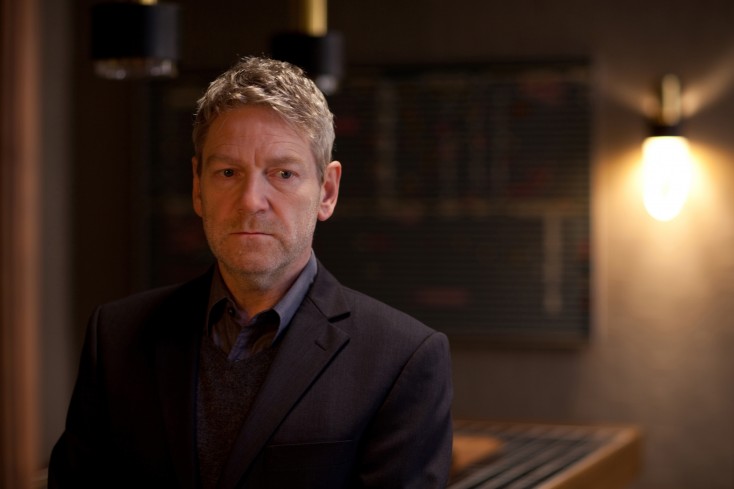By ANGELA DAWSON
Front Row Features
HOLLYWOOD—Kenneth Branagh returns for a third season of “Wallander,” in which the acclaimed British actor and recently inducted knight plays a brooding Swedish police detective.
The Oscar nominee recently spoke at the Television Critics Association Summer Press Tour about what viewers can expect from the upcoming season, which premieres Sunday, Sept. 9 on PBS’ “Masterpiece.” Each of three 90-minute episodes will air over three consecutive Sundays.
“There’s a sort of Swedish kind of purification of him as a type,” the Northern Ireland born actor says of the Swedish character he plays. “He’s just about feeling, and then trying to solve the crime, not necessarily the most efficient way to do it, but it’s his way.”
Branagh, 51, says he suspects the reason for the popularity of the show on both sides of the Atlantic is that the character he plays is different from conventional TV police detectives.
“I suppose the distinction for him is, I would say, relative lack of vanity about his, sort of, personal appearance,” he says. “He doesn’t have the sort of machismo swagger so much. I don’t think so. He’s male in certain possibly tediously predictable ways. He doesn’t carry some of that. He seems to live just for the job and to have a kind of empathy for the victims of a crime that is almost dangerous to him in the way that it’s sort of emotionally debilitating.”
The veteran actor and filmmaker says he was drawn to the Henning Mankell books on which the series is based, before he got involved in the TV adaptation.
“I just read them for enjoyment,” he says. “I do read crime fiction. I do like reading stories of sometimes, absolutely, violence that reveal truths about the human condition and also often provide ingenious tale-telling and plotting from fine authors.”
In contrast to working in Britain or the U.S., filming on location in Sweden offers a unique backdrop, Branagh says. He appreciates the spaciousness of the country’s beautiful yet sometimes climatically harsh environment.
“Everything feels as though it’s been composed by God for you to have a very good think about,” he says with a smile. “It seemed that crime in that harsh environment, severe temperatures, very contrasting moods in the country, from a really pagan engagement with the summer—everybody is out in the streets, everybody stays up late— and the winter, where everybody has to dig in and suffer and endure, does different things to the character.”
Filming abroad also gave the married actor an unsettling sense of isolation for the first two series that he finally came to terms with in the latest go-round. But that personal sense of loneliness helped him find the character, he says.
“When you are out at Wallander’s house, and the lights go off, there’s no ambient streetlight,” he points out. “It’s dead. It’s as pitch black as you can possibly imagine. So, suddenly, an environment that can seem magnificent and majestic in the day, it feels very, very dangerous indeed and full of potential at night.”
He continues, “Characters like Wallander have a chance to meditate almost in a very concentrated way on crime and death and big themes because nothing else is in the way. And so maybe you receive what are familiar scenarios of the awful things that people do to each other but in an entirely different context, whether it’s in that (remote) landscape or the vivid landscape of Stockholm. I think somehow it gives some new character to familiar stories.”
Branagh says the series’ writers try to strike a balance between adhering to the novels and using creative license to adapt the stories to television.
“With Henning’s permission, we have often moved around elements of plots, certain characters from novel to novel, but all more or less within the world of the existing novels with a couple of exceptions,” he explains, noting that “Before the Frost,” the third episode in the upcoming series doesn’t quite follow the novel.
“But we try to do that sometimes nebulous‑sounding thing of staying in the spirit of the originals,” he says, adding that author is a pragmatic man of theater and screen so he knows the show’s writers “need some freedom to interpret for a different medium.
“To directly and literally adapt the circumstances of the novels, which were written some years ago is not what he wants,” Branagh insists. “So we’ve had that kind of license.”
Asked whether he thinks the “Wallander” series could extend into a fourth season, Branagh says it is a distinct possibility.
“If we went into a fourth series, which we hope to with three more films, they would probably include ‘The White Lioness,’ a book that has not been adapted before in any of the Wallander series, which is set in South Africa,” he says. “ It would be updated and we would probably use the last (ninth) novel in the Wallander series, ‘The Troubled Man,’ and we would make two films of that very dense book.”
Branagh, who also is an accomplished filmmaker and theater director, says starring in a TV series has brought his career full circle.
“My first job was in television, and my first time here in Los Angeles was to come to (PBS’) “Masterpiece” and talk about ‘Fortunes of War,'” he recalls.
“So it was a little sense of returning home and doing something like ‘Wallander’ that this was somewhere I belonged with that particular subject matter,” he adds. “With these nine novels we did want to sort of firmly root these adaptations with, and television felt to be a natural medium where we could do a couple of things. We could exploit the power of the close‑up in films that were trying to look inside a man’s head, but we could also give a different kind of visual, filming it in a real and, to us at least, very different kind of landscape.”





